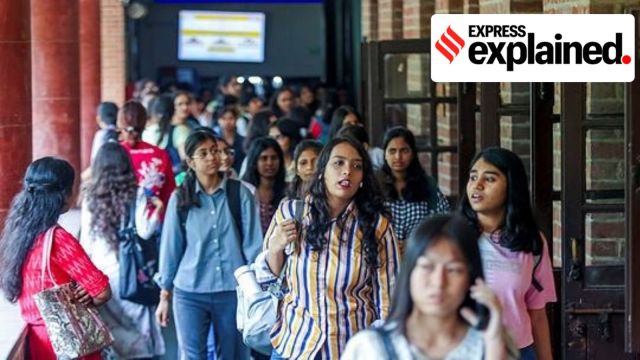What UGC’s draft curriculums for undergraduate courses say, why some states have objected to them
Incorporation of ‘Indian Knowledge Systems’ have led to inclusion of Vedic mathematics, ayurveda-compliant food, and management practices in the Gita and Ramayana. Opposition states have said these ideas are obsolete and steeped in Hindutva.
 Draft curriculums for nine subjects – anthropology, chemistry, commerce, economics, geography, home science, mathematics, physical education, and political science – have been published so far. (Express photo)
Draft curriculums for nine subjects – anthropology, chemistry, commerce, economics, geography, home science, mathematics, physical education, and political science – have been published so far. (Express photo)States ruled by the Opposition have objected to the draft curriculums for undergraduate courses that the University Grants Commission (UGC) published last month. The UGC has invited comments on the drafts, and Karnataka and Kerala have set up panels to examine the curriculums.
Proposed curriculum
Draft curriculums for nine subjects – anthropology, chemistry, commerce, economics, geography, home science, mathematics, physical education, and political science – have been published so far.
These are “learning outcomes-based curriculum frameworks” (LOCFs), which means that they specify the concepts and skills that students are expected to acquire in each course.
The National Education Policy 2020 (NEP) envisions 4-year programs of “multidisciplinary” undergraduate education with the option of exiting the course at various levels. The draft curriculum frameworks specify the credits for each paper.
The NEP calls for incorporating “Indian Knowledge Systems” in the school and higher education curriculums. The draft curriculum for mathematics, suggests an elective course called ‘Kala Ganana’ (timekeeping, as it was understood in ancient Indian traditions) for BA and BSc students who have mathematics as a major or minor.
The course objectives include exploring “the astronomical basis for Indian time measurement and calendar systems”, the development of lunar, solar, and lunisolar calendars in India, and analysing the components of panchanga (the Hindu calendar), including determining “auspicious and inauspicious muhurtas”.
In another suggested elective course at the same level called “Philosophy of Indian Mathematics”, students will “briefly study the Vedas, Vedangas, Puranas and Darshanas as a branch of knowledge and learning”.
The ‘Bharatiya’ curriculum
The draft LOCF for chemistry says “a key aspect that distinguishes this LOCF from previous initiatives is the smooth incorporation of the Indian Knowledge System (IKS) into the curriculum”.
Thus, in a course on “food chemistry”, the new curriculum recommends a unit on “traditional Indian dietary practices as described in ayurveda”, and prescribes a book called Ayurvedic Cooking for Self-Healing. The old LOCF for chemistry has a similar course, but it does not include ayurveda in the chemistry of food.
Again, the draft commerce curriculum recommends a first-year course on Indian management principles and practices, with “Indian (Bhartiya) Scriptures and Management – Bhagavad Gita and Management, Lessons from Ramayana on Management, Vedantic and modern perspectives on Management, Contribution of Bhartiya Scriptures to the evolution of Management concepts” – as a unit. The old LOCF did not have this.
An official said UGC has previously released subject-specific curriculum frameworks for 38 subjects, which were aligned with the choice-based credit system, and were developed from 2019-20 onward. Discussions on the LOCF following the rollout of the NEP prompted a fresh curriculum framework, the official said.
According to the NEP, a Higher Education Commission of India (HECI) will frame learning outcomes for higher education programmes, and specify a curriculum framework within which higher education institutions may prepare their own curricula. However, this higher education regulator is yet to be constituted.
Opposition to curriculum
Kerala’s Higher Education Minister R Bindu has said the draft curriculum contains “obsolete” and unscientific ideas, and ideas steeped in “Hindutva ideology”. She has pointed to the mention of “Ram Rajya” – the curriculum for commerce says concepts like Ram Rajya (equitable governance) can be explored in the context of corporate social responsibility.
Also, the recommended reading for the first-year “Freedom Movement in India” course in the draft curriculum for political science includes Hindutva icon V D Savarkar’s The Indian War of Independence (1909). The draft curriculum also has a separate elective course on Savarkar.
Karnataka Higher Education Minister M C Sudhakar has alleged that the curriculum framework is an attempt by the central government “to seed their ideologies among students”. Sudhakar has also objected to UGC’s alleged interference in curriculums.
The UGC official quoted above said that universities retain autonomy to adapt or redesign modules in line with institutional priorities and regional contexts.
When the earlier LOCFs were developed, UGC wrote to vice chancellors of universities asking them to revise their curriculums – and universities, including University of Kerala, had updated their curriculums to align with the LOCF.
- 01
- 02
- 03
- 04
- 05






































